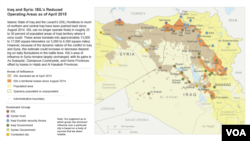U.S. military officials said Islamic State militants have lost more than one-quarter of the territory they had gained in their campaign to create an Islamic caliphate. A U.S. defense official Monday said this is the result of a combined effort of coalition air strikes and a ground operation by Iraqi armed forces.
A new map released by the Pentagon shows that Iraqi forces regained key territories in the north, near Tikrit, Sinjar Mountain and the Mosul Dam.
Pentagon spokesman Col. Steve Warren told Alhurra television Monday that Islamic State lost control of nearly 15,000 square kilometers of the territory it had captured since last August.
"In Tikrit, as you know, we are concluding a very successful operation to liberate that city from the clutches of Daesh [Islamic State], and that operation has been largely successful. There are small parts of Tikrit which remain somewhat contested, primarily because Daesh left so many booby traps, so many IEDs [improvised explosive device] and perhaps a few fighters, snipers and such that remain really only in the northern portion of Tikrit," he said.
Efforts to push back Islamic State in Syria have been less successful, Warren said.
"In Syria, ISIL has had some small gains in the city of Damascus and a little bit in the south, also a little bit in Aleppo, but ISIL has also lost some ground in Syria as well, particularly around Kobani. The difference is that in Iraq, the coalition air power is being supported by the brave soldiers of the Iraqi security forces," he explained.
Warren said the coalition strategy is to prevent the militants from creating a safe haven in Syria while pushing them out of Iraq.
Some analysts said the real test in this battle against Islamic State will be in predominantly Sunni areas of Mosul and Anbar province.
"Who knows when that will actually happen because if Iraq wants to do this right, it can't do it with Shia militias. It can't go into neighborhoods that are predominantly Sunni [Muslim] and run roughshod over these communities," said Brian Katulis, with Center for American Progress.
United Nations chief Ban Ki-moon welcomed the liberation of Tikrit, but expressed alarm at the reports of human rights violations and destruction of property perpetrated by militias fighting alongside Iraqi forces.
One way to prevent ethnic violence in areas freed from Islamic State is to form local army units to defend their own ethnic or religious communities.
“Iraq doesn't really have that now,” noted Michael O’Hanlon, Brookings Institution. “And the current approach seems to be to try and create this ecumenical, multi-ethnic army that is a truly national force and will deploy from anywhere to anywhere within Iraq."
The militants still control large swaths of northern Iraq, including many oil refineries that help finance their campaign.

